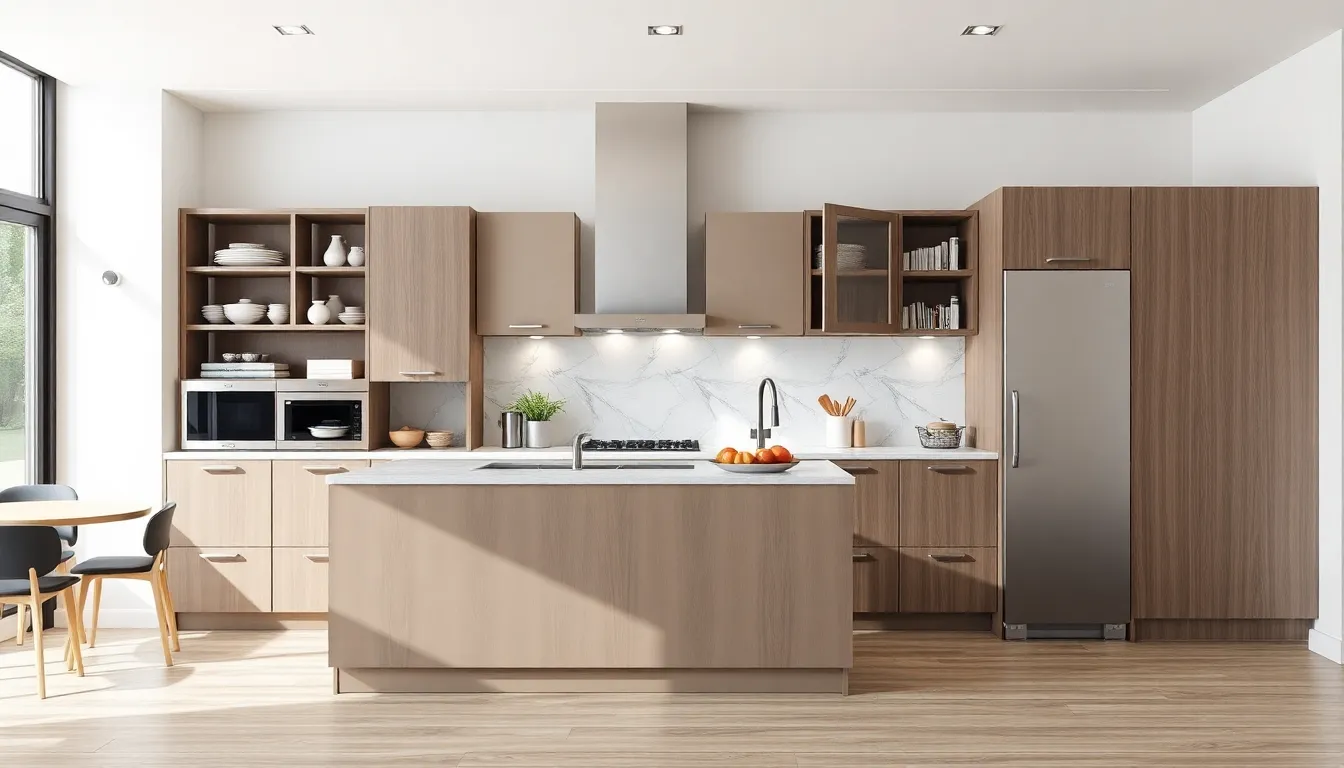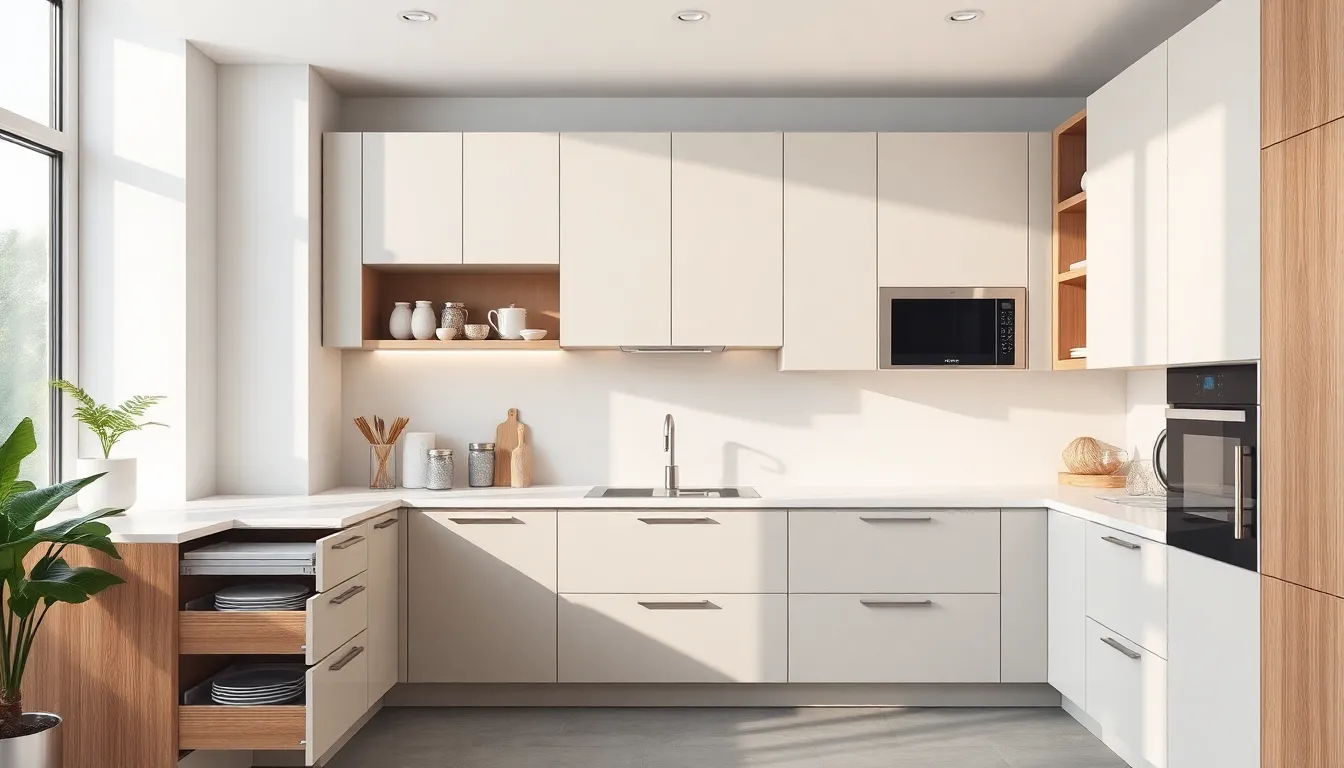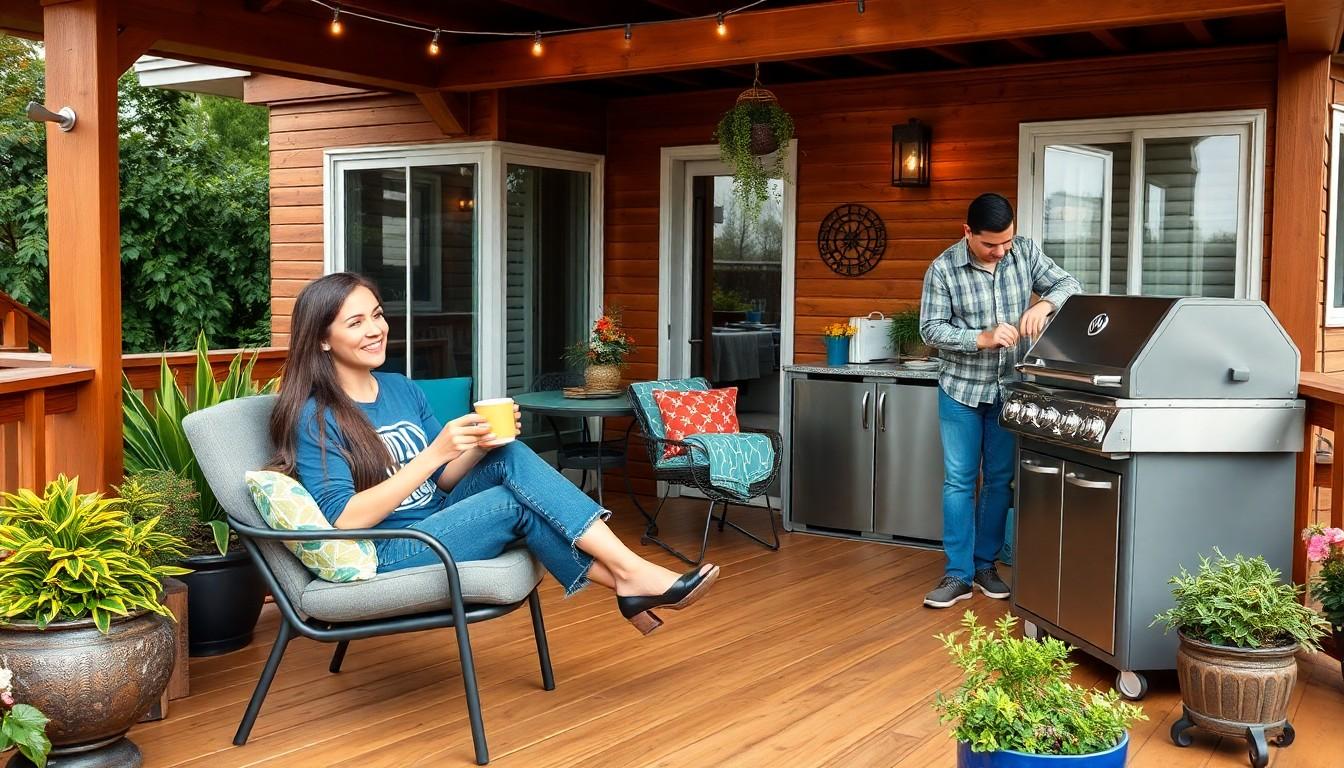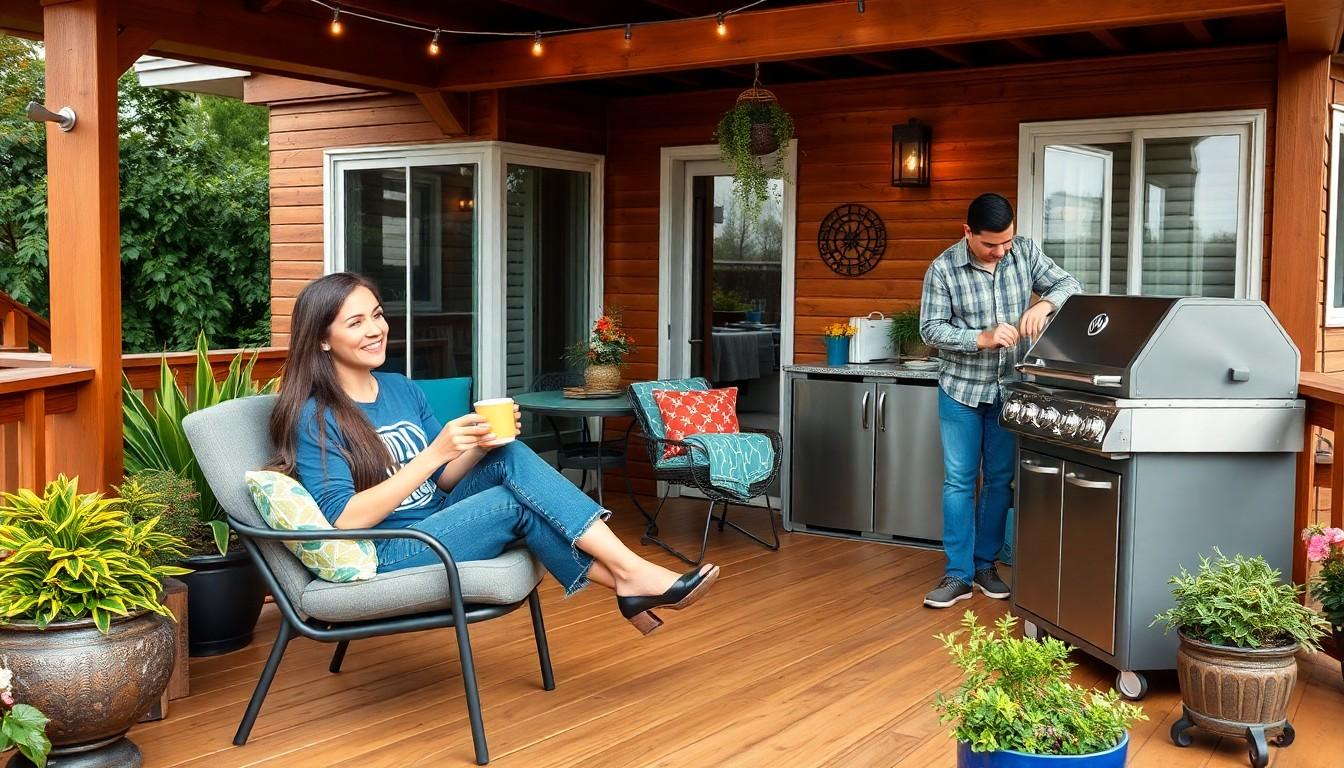In a world where kitchen chaos reigns supreme, modular kitchens swoop in like superheroes armed with stylish cabinets and clever storage solutions. They transform cramped cooking spaces into organized culinary havens, making meal prep feel like a breeze instead of a wrestling match with pots and pans. Who wouldn’t want a kitchen that looks like it walked straight off a home décor magazine?
Modular kitchens aren’t just about looks; they’re about maximizing efficiency and functionality. With customizable designs, they adapt to any space, making them the perfect fit for both tiny apartments and sprawling homes. So whether you’re a gourmet chef or a microwave magician, a modular kitchen is your ticket to cooking bliss. Say goodbye to clutter and hello to a space where creativity can flourish, and dinner parties become legendary.
Table of Contents
ToggleOverview of Modular Kitchens
Modular kitchens consist of pre-fabricated units that simplify installation and maintenance. Each unit is designed for specific functions, offering a customizable approach to kitchen design. These kitchens provide versatility in layout, suiting various spaces and preferences.
Different styles appeal to various tastes, from contemporary to traditional finishes. Customization options include cabinetry, countertops, and appliances selected to match individual needs. Space efficiency stands out as a significant advantage, allowing for optimized storage solutions and organized layouts.
In recent years, innovative materials have emerged, enhancing durability and aesthetic appeal. Various materials, like plywood, particleboard, and medium-density fiberboard, cater to budget and style requirements. Each material delivers unique benefits, ensuring ample choices for homeowners.
Installation processes for modular kitchens are straightforward, often completed in days rather than weeks. Professionals streamline the setup, minimizing disruptions in the home environment. This rapid transformation quickly enlivens cooking spaces, making them both beautiful and functional.
Sustainability plays a growing role in kitchen design, with eco-friendly materials and finishes gaining attention. Consumers increasingly prefer kitchens that reflect their values, supporting sustainable living and reducing environmental impact. Manufacturers are responding to this demand by offering more environmentally conscious options.
Users appreciate that modular kitchens allow for easy upgrades. Changing appliances or reconfiguring layouts remains feasible as needs evolve. With modern trends driving innovation, many owners find that modular kitchens offer long-term value in both function and style.
Benefits of Modular Kitchens

Modular kitchens offer numerous advantages that enhance both function and aesthetic appeal. They provide efficient space utilization and a variety of customization options.
Efficient Space Utilization
Efficient space utilization ranks among the significant benefits of modular kitchens. Built-in cabinets and shelves maximize storage without sacrificing style. Each component of a modular kitchen is designed to fit specific dimensions, accommodating even the smallest areas. To create a clutter-free environment, pull-out drawers and corner units store utensils and appliances neatly. Vertical storage options like tall cabinets make the most of unused vertical space. These features make the kitchen highly functional while keeping it organized and visually appealing.
Customization Options
Customization options stand out as another compelling reason to choose modular kitchens. Homeowners can select cabinetry, finishes, and appliances that match their personal style. Various layouts suit different cooking habits, enabling a seamless workflow in the kitchen. Shaker style doors may appeal to those favoring a traditional look, while sleek gloss finishes might attract modern design enthusiasts. Mixing elements from various styles creates a unique kitchen tailored to individual tastes. Flexibility in design allows for easy adaptations as needs evolve, further enhancing the kitchen’s functionality.
Popular Materials for Modular Kitchens
Various materials enhance the functionality and aesthetics of modular kitchens. Wood and laminates stand out as popular choices, each offering unique advantages.
Wood
Wood provides warmth and elegance, making it a favored material in modular kitchens. Different species like oak, maple, and walnut offer diverse appearances and qualities. Designers appreciate solid wood for its durability and natural appeal. Engineered wood products, such as plywood, offer a cost-effective option that maintains strength while reducing warping. Sustainability plays a role, with many opting for responsibly sourced wood to align with eco-friendly practices. Expect designs that highlight natural grains, providing a timeless charm that complements various kitchen styles.
Laminates
Laminates present versatility and affordability, appealing to many homeowners. Available in numerous colors and patterns, they mimic more expensive materials like wood or stone. Laminates resist stains and scratches, ensuring long-lasting performance in a busy kitchen. Easy maintenance enhances their popularity, requiring only a simple wipe-down to keep surfaces clean. Various finishes, from glossy to matte, allow homeowners to achieve their desired aesthetic effortlessly. Combining style and function, laminates serve as a practical choice across diverse modular kitchen designs.
Design Trends in Modular Kitchens
Modular kitchens showcase several exciting design trends, reflecting both aesthetics and functionality. The latest styles embrace innovative concepts, making modern cooking spaces enjoyable and efficient.
Minimalist Designs
Minimalist designs characterize many contemporary modular kitchens. Clean lines and clutter-free countertops create an open atmosphere ideal for cooking. Neutral color palettes, including whites and beiges, set a calm backdrop, allowing for accent pieces to shine. Streamlined cabinetry keeps items organized, ensuring easy access without overwhelming the space. Simplicity in design promotes serenity, transforming the kitchen into a welcoming environment. Prioritizing functionality and elegance, minimalist trends resonate well with modern homeowners seeking practical yet stylish solutions.
Smart Technology Integration
Smart technology integration plays a crucial role in modern modular kitchens. Automation features enhance everyday cooking tasks, from smart ovens that can be controlled remotely to refrigerators that monitor inventory. Users enjoy the convenience of voice-activated assistance and app-controlled appliances, allowing for a seamless culinary experience. Smart lighting systems add another layer, adjusting brightness based on time of day or activity. Incorporating technology not only improves efficiency but also elevates the kitchen’s overall aesthetic, merging style with tech-savvy solutions. As homeowners embrace these advancements, modular kitchens evolve into innovative hubs of creativity and productivity.
Installation Process of Modular Kitchens
The installation process of modular kitchens involves several systematic steps that ensure efficiency and precision. First, it starts with accurate measurements of the kitchen space to determine the appropriate dimensions for the modular units.
Next, professionals prepare the site, which might include clearing the area and making necessary electrical or plumbing adjustments. Once the site is prepared, installers assemble the pre-fabricated units according to the layout plans.
Cabinets are typically mounted on the walls first, providing a base for subsequent installations. After the wall cabinets, base cabinets get placed, ensuring a sturdy foundation for counters and appliances.
Countertops come next, often customized to fit the chosen cabinetry. Sealing the joints helps to enhance durability and aesthetics.
Considerations for appliances follow, making sure they fit seamlessly into the kitchen design. Installing built-in appliances can enhance the overall look and functionality.
The final touches include installing hardware such as handles, knobs, and lighting fixtures to ensure everything is functional and visually appealing.
Quality checks during each phase ensure that installations meet the highest standards. This systematic approach minimizes disruptions, making the process swift and efficient within a few days.
Ease of installation sets modular kitchens apart, allowing for a hassle-free experience that aligns with the growing demand for customizable and stylish kitchen solutions.
Maintenance Tips for Modular Kitchens
Regular cleaning prevents the buildup of grime in modular kitchens. Use a soft cloth and mild detergent for routine wipes on surfaces. Avoid harsh chemicals that can damage finishes or materials.
Inspect cabinets and drawers frequently for signs of wear. Tighten loose screws or hinges promptly to maintain functionality. This attention extends the lifespan of cabinetry systems.
Avoid excessive moisture in kitchen areas. Keep surfaces dry after cooking by using ventilators and exhaust fans. Water damage can lead to deterioration of materials, particularly in wood and laminated finishes.
Check seals around sinks and countertops regularly. Replace any worn-out silicone or caulking to prevent leaks. Sealing gaps promptly protects underlying structures from mold and mildew.
Once every few months, polish surfaces to retain their luster. Choose finishes designed specifically for the material used. Polishing enhances appearance while also providing an additional protective layer.
Store items properly within cabinets to minimize clutter. Organizing utensils and cookware allows easy access and keeps the kitchen functional. This practice helps maintain a clean and efficient cooking environment.
Opt for routine professional maintenance for appliances. Allowing qualified technicians to check wiring and functionality ensures safe operation. Professional servicing extends the durability and efficiency of built-in appliances.
By following these maintenance tips, homeowners can ensure their modular kitchens remain functional and stylish over time. Prioritizing these actions results in a long-lasting, appealing cooking space that caters to various culinary needs.
Modular kitchens stand out as a versatile solution for modern living. They combine style and functionality to create efficient cooking spaces that cater to diverse needs. With customizable designs and innovative materials, homeowners can achieve a balance between aesthetics and practicality.
The ease of installation and maintenance further enhances their appeal, making them a popular choice for many. As sustainability becomes a priority, eco-friendly options in modular kitchens are gaining traction, reflecting a commitment to responsible living.
Investing in a modular kitchen not only transforms the cooking experience but also adds long-term value to the home. With the right design and materials, these kitchens can truly become the heart of the home, inspiring creativity and culinary exploration.



